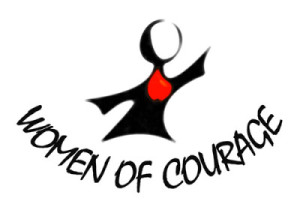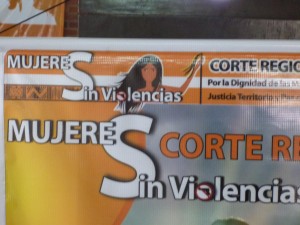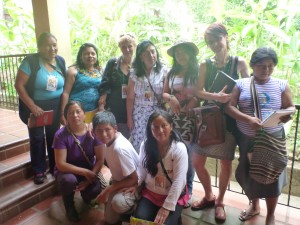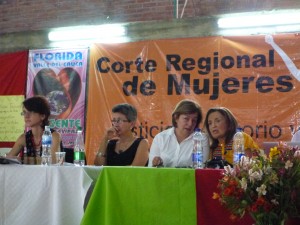WOMEN’S REGIONAL COURT FOR JUSTICE, TERRITORY AND PEACE IN CALI – Final Verdict

Justice, Territory and Peace
PUBLIC HEARING
Cali, November 27th and 28th, 2012
The Women’s Regional Court was conceived as a space for the recuperation of memory, for truth, justice for women, the defense and conservation of territories, reparation and non-repetition of different forms of violence against Indigenous women of the Cauca Valley, Cauca, Nariño and Huila, as well as Afro-Colombian women and campesino spokeswomen from various social organizations from south-western Colombia. The judges of the Women’s Regional Court have heard the testimonies shared by the victims themselves and the voices of those women who resist and persevere despite their tragic and adverse circumstances, and who are at the same time creating proposals for peace, justice and land, based on women’s perspectives.
We declare that the reflections leading to the current ruling are based on the rights of Indigenous Peoples in Colombia, the CEDAW, the Convention of Belem do Para, the United Nations Declaration on the Rights of Indigenous Peoples, United Nations Security Council resolutions 1325, 1820 and related resolutions, as well as domestic norms and jurisprudence.
We commend the courage demonstrated by the women who face disproportionate impacts of the armed conflict, their strength and their bravery in denouncing the violations of their rights, the courage of the women who dare speak, express their sorrows, and show the harms that shackle them. We further commend the work that goes into the recuperation of memory, resistance and heightening the visibility of the seriousness of these crimes.
We conceive of territory and land as an open and sacred space which includes Mother Nature, women and men, as well as the relations amongst them, where structural, sociopolitical, sexual, psychological and physical violence against women affects the harmony of the land: “if there is no land, there will be nothing else.” The conception of the body as the most basic sacred territory that no one may violate is a basic premise for the women present in this court.
We acknowledge the deep and strong relationship between the body as the first sacred territory of Indigenous women and Mother Earth. Therefore mining exploitation, environmental damages, land pollution, fumigations, air raids, militarization and land evictions break the bond and harmony with Mother Nature, constituting violence against women.
We believe that Indigenous and Afro-Colombian women in Colombia are excluded and discriminated against due to their gender, poverty, racism, and the armed conflict.
We believe that, as was established in the World Conference on Women held in Beijing, violence against women is a result of the power struggles established by patriarchal culture and that it is strengthened by economic models based on accumulation of wealth. [1]
We ascertain that the violence resulting from the armed conflict exacerbates and increases the forms of violence that affect and have historically affected women, and that these are a result of the patriarchal system which reproduces discriminatory practices towards women in private and public spaces.
We emphasize that there continues to be high levels of impunity in relation to violence against women within and outside the context of the armed conflict. The repeated occurrence of these events is in turn enabled by the State’s disregard of its duty to respond with due diligence[2].
We stress that in accordance with resolutions 1325, 1820 and related resolutions of the United Nations Security Council, these forms of violence against women must be highlighted so that they may be included in the context of the peace dialogues process.We ascertain that when violence affects Indigenous women, the balance and harmony of the community and the land, which are considered sacred for these age-old cultures, are also affected. Some of the consequences include the de-harmonization demonstrated by social conflicts within communities, an increase in domestic violence, an increase in such behaviours as robbery and fights, amongst other acts.
We ascertain that the relationship with nature and land has been altered by the presence of mining, oil, gas, and electricity corporations which have invaded sacred territories and, through resource extraction, have affected women in particular, given that they are in touch with the land, they protect and cultivate it, feeding their communities from the fruit of this labour.
We confirm that the geothermal energy projects promoted by ISAGEN, as well as the intentions of authorities to redefine the limits of the protections, clearly impact the territory. Furthermore, the rights of sovereignty and self-determination of Indigenous and Afro-Colombian Peoples are violated when the construction of dams and the development of oil and gas projects as well as mining projects from ANGLO GOLD ASHANTI, amongst others, occur with no prior consultation with the communities.
We stress that fumigation through aerial spraying of crops used for illicit purposes has affected the environment and health of the communities that live in the area, and has endangered the food security of women, their families and community. Furthermore, the trafficking of these products has weakened age-old practices of Indigenous Peoples and the social and cultural relations of Afro-Colombian and campesino communities.
We ascertain that along with the increase in activities and proposals for the development of dams, oil, gas and mining activities, the militarization of the region has become noticeable through the settling of military squads on their sacred territories or residential areas, turning communities into human shields and ignoring International Humanitarian Law.
We have established that the strategy of the public security forces, within the context of the National Consolidation Plans, to use health, education, infrastructure and other campaigns to foster closer relations with communities in areas affected by the conflict exposes the communities, and particularly women and children, to risk. This is the case given that they are considered part of the public security forces networks, thus not recognizing the principle of distinction.
We ascertain that the militarization of Indigenous territories as well as lands of Afro-Colombian and campesino communities increases the risk for their members. Furthermore, the stigmatization of women who are suspected of being involved with legal or illegal armed actors through romantic luring, or whose leadership roles lead them to be singled out in order to attack their work, constitutes serious risks to their lives and their bodies.
We have confirmed the practice of forced recruitment imposed on children and youth by armed actors (legal and illegal), which has also forced women to become displaced in order to protect their children’s lives. Numerous women have bravely risked their lives attempting to rescue their recruited children.
We have ascertained the existence of extrajudicial executions, called “false positives”, carried out by members of the public security forces which, in order to guarantee impunity, have sought to present the victims as casualties killed in combat. The Court has indicated the serious nature of recent imprisonments motivated by reports from the public security forces and accounts from demobilized actors or informants who are paid and promised benefits – such acts constitute unjustified and arbitrary detentions. In these cases the seriousness of the attacks has forced women to abandon their daily activities and homes in order to present themselves before the authorities in search of justice.
We have confirmed the existence of physical, psychological violence against Indigenous women within their communities, in which the pertinent authorities have not exercised justice for those responsible for these acts. Furthermore, there is discrimination from the part of authorities when the victim has been a woman.
We stress that the measures for recovery, restitution and reparation adopted by the State have not taken into account differential criteria for Indigenous and Afro-Colombian women, as they do not take into consideration their worldview and culture.
We denounce the role of the media, which stigmatizes entire communities by sourcing information exclusively from the communiqués produced by armed actors (legal and illegal). This in turn heightens the risk level for community members and leaders, distorting reality and the truthful turn of events.
Due to the aforementioned, this Court RESOLVES
To highlight the value of the actions carried out by the women who have taken part in this court and who, supported by their wisdom, age-old knowledge and spirituality, have shed light on systemic acts that constitute crimes against humanity and pains that express the various forms of violence against them, and who demand the creation (at the local, national and international levels) of mechanisms to restore their rights to life and the harmonization of the territories.
1. Sociopolitical Violence
– To condemn the systemic practices of militarization of territories belonging to Indigenous and Afro-Colombian communities which break the balance and violate their rights.
– To demand respect for International Humanitarian Law and specifically the principle of distinction. Therefore, we condemn the practices of the military forces, also implemented by other armed groups, in relation to community services such as health and education campaigns, amongst others.
– To condemn the practice of extrajudicial executions of members of Indigenous, Afro-Colombian and campesino communities in the region and the consequences of these crimes for women and communities.
– To condemn the involvement of members of the military with women from the area as a war and information-gathering strategy.
– To condemn the practices of all armed actors that lead to the stigmatization of civilians.
– To condemn the persecution of female community leaders and women’s organizations from the part of all armed actors.
– To condemn the State for its failure to exercise the principle of due diligence, for the existing impunity and the re-victimization to which women are subjugated when seeking access to judicial authorities.
2. Socio-Economic Violence
– To condemn the State for the historic neglect towards Indigenous, Afro-Colombian and campesino communities in the southwest of the country.
– To demand that corporations and the State fulfill the right to free, prior and informed consent of Indigenous and Afro-Colombian Peoples, and respect the economic, social, cultural and environmental rights, as set out in international standards.
– To condemn the pollution of water sources and wetlands, as a result of large-scale projects, mining and natural resource exploitation and the settlement of military squads in those areas.
– To condemn the impacts of large-scale projects on the lives of women, on their daily activities and on their relationship with nature.
– To demand that the State respect the limits previously established with respect to the territories of Indigenous communities.
– To condemn the Colombian State for omission and commission in relation to the plunder and displacement experienced by the women of Indigenous, Afro-Colombian and campesino communities of the region.
3. Sexual Violence
– To call for Indigenous communities to take the necessary measures to eradicate sexual violence against women in the area.
– To demand of the judicial authorities to fulfill their obligation to investigate, penalize and remedy the cases of sexual violence against women within and outside the context of the armed conflict.
– To denounce and condemn acts of sexual violence against women carried out by members of legal and illegal armed groups, which range from seduction, supported by uniforms and arms, to the murder of women as scare tactics for the population, to get back at the enemy, demoralize and devalue women, and control the land.
4. Cultural Violence
– To call for communities to recognize the organizational and leadership work of women within them and to generate the appropriate mechanisms to strengthen and encourage the equitable participation of women within community decision-making processes and affairs.
– To demand that the State fulfill its obligation to prevent violence against women within and outside the context of the armed conflict.
– To demand that the State take all the necessary measures to eliminate systemic practices of racism against Indigenous and Afro-Colombian women.
– To demand that the State demilitarize the territories of Indigenous communities, respect these communities, and allow the connection of communities with the land as a form of life.
– To demand that the State adopt the necessary measures, according to the communities, to grant effective protection of women who dare speak out against violence and discrimination against women.
We encourage all women to continue in their just struggle for life, land, and dignity and we declare our commitment to follow up on this decision, conveying it to all corners of the world.
SYMBOLIC JURY OF THE SOCIAL MOVEMENT OF WOMEN AGAINST WAR AND FOR]
Rachel Warden
Jorge Molano
Susan Ferguson – Observer
Elizabeth Caicedo
Francy Jaramillo Piedramita
Carolina Davila











